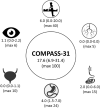Autonomic dysfunction in post-COVID patients with and witfhout neurological symptoms: a prospective multidomain observational study
- PMID: 34386903
- PMCID: PMC8359764
- DOI: 10.1007/s00415-021-10735-y
Autonomic dysfunction in post-COVID patients with and witfhout neurological symptoms: a prospective multidomain observational study
Abstract
The autonomic nervous system (ANS) can be affected by COVID-19, and dysautonomia may be a possible complication in post-COVID individuals. Orthostatic hypotension (OH) and postural tachycardia syndrome (POTS) have been suggested to be common after SARS-CoV-2 infection, but other components of ANS function may be also impaired. The Composite Autonomic Symptom Scale 31 (COMPASS-31) questionnaire is a simple and validated tool to assess dysautonomic symptoms. The aim of the present study was to administer the COMPASS-31 questionnaire to a sample of post-COVID patients with and without neurological complaints. Participants were recruited among the post-COVID ambulatory services for follow-up evaluation between 4 weeks and 9 months from COVID-19 symptoms onset. Participants were asked to complete the COMPASS-31 questionnaire referring to the period after COVID-19 disease. Heart rate and blood pressure were manually taken during an active stand test for OH and POTS diagnosis. One-hundred and eighty participants were included in the analysis (70.6% females, 51 ± 13 years), and OH was found in 13.8% of the subjects. Median COMPASS-31 score was 17.6 (6.9-31.4), with the most affected domains being orthostatic intolerance, sudomotor, gastrointestinal and pupillomotor dysfunction. A higher COMPASS-31 score was found in those with neurological symptoms (p < 0.01), due to more severe orthostatic intolerance symptoms (p < 0.01), although gastrointestinal (p < 0.01), urinary (p < 0.01), and pupillomotor (p < 0.01) domains were more represented in the non-neurological symptoms group. This study confirms the importance of monitoring ANS symptoms as a possible complication of COVID-19 disease that may persist in the post-acute period.
Keywords: Autonomic dysfunction; COMPASS-31; COVID-19; Long-COVID; Orthostatic intolerance.
© 2021. The Author(s).
Conflict of interest statement
The authors have no conflicts of interest to declare.
Figures


References
Publication types
MeSH terms
LinkOut - more resources
Full Text Sources
Medical
Miscellaneous

